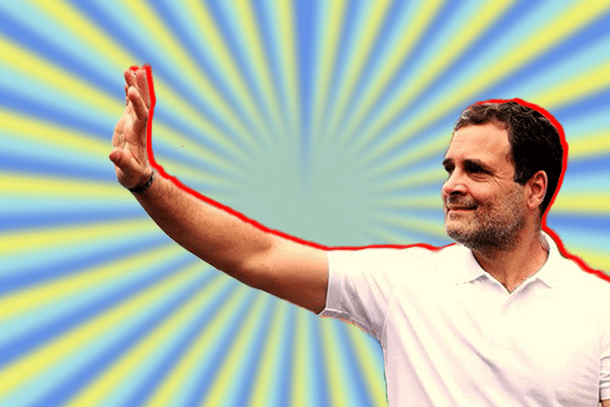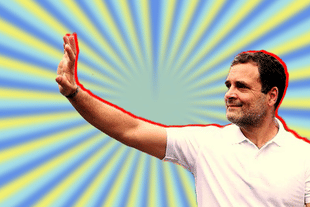Commentary
'Jai Shri Ram' Versus 'Jai Siya Ram' — A Manufactured Controversy Rooted In Hinduphobia
Swati Goel Sharma
Jan 13, 2023, 01:26 PM | Updated Jan 20, 2023, 02:29 PM IST
Save & read from anywhere!
Bookmark stories for easy access on any device or the Swarajya app.


Congress leader and scion of the Nehru-Gandhi family Rahul Gandhi, in a press meet two days ago in Haryana’s Ambala city, said that members of the Rashtriya Swayamsewak Sangh (RSS) have thrown the name of Sita out of the “Jai Siya Ram” chant to only take Ram’s name.
Gandhi was in Ambala for his ongoing Bharat Jodo Yatra.
His comments were promptly panned by Bharatiya Janata Party (BJP) leaders of Haryana including Chief Minister Manohar Lal Khattar, who said Gandhi should attend an RSS shakha for a few days to know RSS, about which he currently knows nothing.
Khattar took a jibe at Gandhi saying “he remains a Pappu”.
While the political slugfest over Gandhi’s remark continues, the case of ‘Jai Siya Ram’ against ‘Jai Shri Ram’ needs public attention.
It has been a long-standing argument of the communists that the chant of Jai Shri Ram is an angry masculine slogan propagated by “Hindu extremists” by tampering with the age-old Hindu chant of Jai Siya Ram that puts the name of Sita first and, by virtue of it, purely devotional.
Their theory suggests that the public at large must shun those who chant Jai Shri Ram for they are patriarchal and discriminatory.
Gandhi was only furthering this communist trope when he made the controversial comment in Ambala. Gandhi has promoted other Marxist ideas in the past including hinting that India is just a union of states and not a nation.
Then Communist Party leader and now Congress member Kanhaiya Kumar, who rose to infamy for his alleged role in a pro-separatist event at Jawaharlal Nehru University in 2016, too propagated this trope in 2019. When a woman student from Mangalore greeted Kumar on stage with ‘Jai Shri Ram’, Kumar replied that he would rather chant “Sita-Ram”.
Last January, West Bengal Chief Minister Mamata Banerjee refused to speak at an event after some people in the audience raised the chants of ‘Jai Shri Ram’. A member of her party All India Trinamool Congress justified Banerjee’s action saying Jai Shri Ram is a “political slogan of the BJP” as opposed to ‘Jai Siya Ram’, which is a “religious call in service of the divine”.
Banerjee repeated it again last month when she refused to sit on the dais after some people chanted Jai Shri Ram.
Below is a response to this Leftist propaganda persuaded by so-called secularists:
Claim: Jai Shri Ram Originated In ‘90s
Response: Leftists claim that Jai Shri Ram originated during the Ram Janmabhoomi movement in the 1990s. The Hindu movement was accompanied by the demolition of Babri mosque, which was itself built by the Mughals after demolishing an erstwhile Ram temple, widely believed to be the birthplace of Lord Ram.
The claim is pure conjecture as is evident from a 1948 devotional film which prominently shows the chant ‘Jai Shri Ram’ displayed in a devotional song. The film, Shri Ram Bhakta Hanuman, was made by Homi Wadia of Mumbai’s prominent Wadia family.
Jai Shri Ram, which means ‘glory to Ram’ is a bhakti chant that has been in place for many decades, and is far from being a Hindu extremist war-cry as is claimed by the Leftists.
Claim: Jai Shri Ram Is Patriarchal
Response: While Hindus widely revere both Lord Ram and his wife Sita, chanting the name of Lord Ram alone does not make a person patriarchal.
By that logic, chanting the name of a male Prophet without taking the name of his wife, or wives, is as patriarchal. Why then the same Leftists never go after those chants?
Lord Ram is widely revered as ‘maryada purushottam’ or the ideal man. Those who idolise him take his name.
Many others chant only ‘Radhe Radhe’, thus excluding Lord Krishna from the chant. In Mathura, the birthplace of Lord Krishna, people on the streets greet each other with ‘Radhe Radhe’.
In Gujarat, the land of Dwarka, residents are known to use ‘Radhe Krishna’ for greeting. People all over India chant ‘Jai Mata Di’ or one of its variants, which is a bhakti chant raised in the glory of Ma Durga.
Claim: Jai Shri Ram Is Discriminatory
Response: This claim suggests that chanting the name of one deity is discriminatory to others. A columnist-author went so far to tweet last year that he was told by Morarji Desai during the Janmabhoomi movement that “Hindutva loonies” are turning Hinduism into an Abrahamic religion of one god that is Lord Ram, one book that is Ramayan and one holy place that is Ayodhya.
This argument, though widespread among Leftists, is so obviously baseless that no Hindu group or organisation in India has ever appealed, let alone be violent about it, against worshipping other Hindu deities than Lord Ram, such as Lord Krishna or Mata Sita. The argument has zero basis in reality.
In fact, a long pending demand of Hindu groups is to restore temples at Kashi Vishwanath and Krishna Janmabhoomi that are associated with Lord Shiva and Lord Krishna.
Claim: Jai Shri Ram Is A Political Slogan
Response: Jai Shri Ram is a bhakti slogan. That many of those who chant Jai Shri Ram also vote for the BJP, perhaps due to the political party’s support to the public sentiment that the mosque built over the Ram Janmabhoomi site deserved a Ram temple, does not make it a BJP slogan.
The Ram Janmabhoomi movement itself was not started by the BJP. The first recorded legal history of the Ram Janmabhoomi dispute dates back to 1858, much before the BJP was born, which was in 1980.
Swati Goel Sharma is a senior editor at Swarajya. She tweets at @swati_gs.




